Words and photos by Stephan Matthiesen
Twenty three early career researchers from 8 countries learned about all aspects of greenhouse gas research in the DARE-UK & CLASS International Summer School on Greenhouse Gases, which we organised at the National Oceanography Centre (NOC) in Southampton on 10-16 July 2022. The interdisciplinary one-week class with a mixture of lectures, exercises and excursions introduced key greenhouse gases and the processes that govern their dynamics in the atmosphere, oceans and biosphere as well as important measurement techniques.
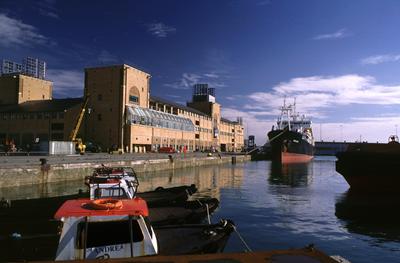
Originally planned for 2020 and delayed twice due to the Covid pandemic, this summer school was a long-awaited opportunity for many of the participants to meet fellow early career researchers from other countries for the first time. The general enthusiasm was already noticeable when everybody arrived on Sunday, and soon a lively atmosphere developed with intense chats and plans for social activities in the evenings. The programme in Sunday afternoon started with an opportunity for all students to introduce their own research in fast-paced two-minute presentations. In an overview lecture, Andrew Watson (University of Exeter) drew on his extensive knowledge and experience to provide unique insights into the challenges facing the research on greenhouse gases.
Monday was focussed on the terrestrial biosphere, lead by Nick Cowan (CEH Edinburgh). Nick explained the role of greenhouse gases in ecosystems, including the non-CO2 species (methane and nitrous oxide) which are particularly relevant in the biosphere. Besides lectures, he demonstrated the use of flux chambers in one of the gardens of the NOC, and in a practical computing exercises the students gained experience analysing sample data from an eddy covariance system. In the evening, the eagerness of the participants for social interaction meant that a pub visit was quickly organised, and we sampled many local drinks while chatting about life and work in different countries.

The next morning, Mark Lunt (University of Edinburgh) introduced the students to atmospheric modelling of greenhouse gases with lectures and computer practicals, and in the afternoon Neil Humpage (University of Leicester) also used lectures and computer exercises to show students how satellite observations can monitor greenhouse gases in the atmosphere.
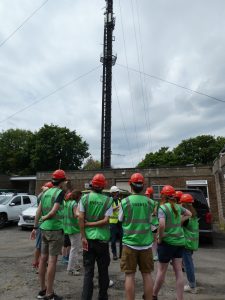
Wednesday was excursion day. We drove to Mayfield, a picturesque village in East Sussex, and spent the day (including a very tasty dinner) in the Middle House, an oak-beamed pub built in Tudor times in the 16th century. Of course, the purpose of the visit was not touristic (although there was time to explore the village during coffee breaks): Students visited the nearby Heathfield tall tower in small groups and learned about the instrumentation for monitoring greenhouse gases, and a team from the National Physical Laboratory (NPL) had set up various activities and exercises in the pub. One particularly exciting experiment was a GHG camera, an infrared camera with specific filters for the emission wavelengths of carbon dioxide and methane, used e.g. for imaging leaks in gas installations. While some had heard of such cameras before, few had seen them in action, and it was fun actually being able to see the clouds of carbon dioxide that billow up from the mouth when you breathe.
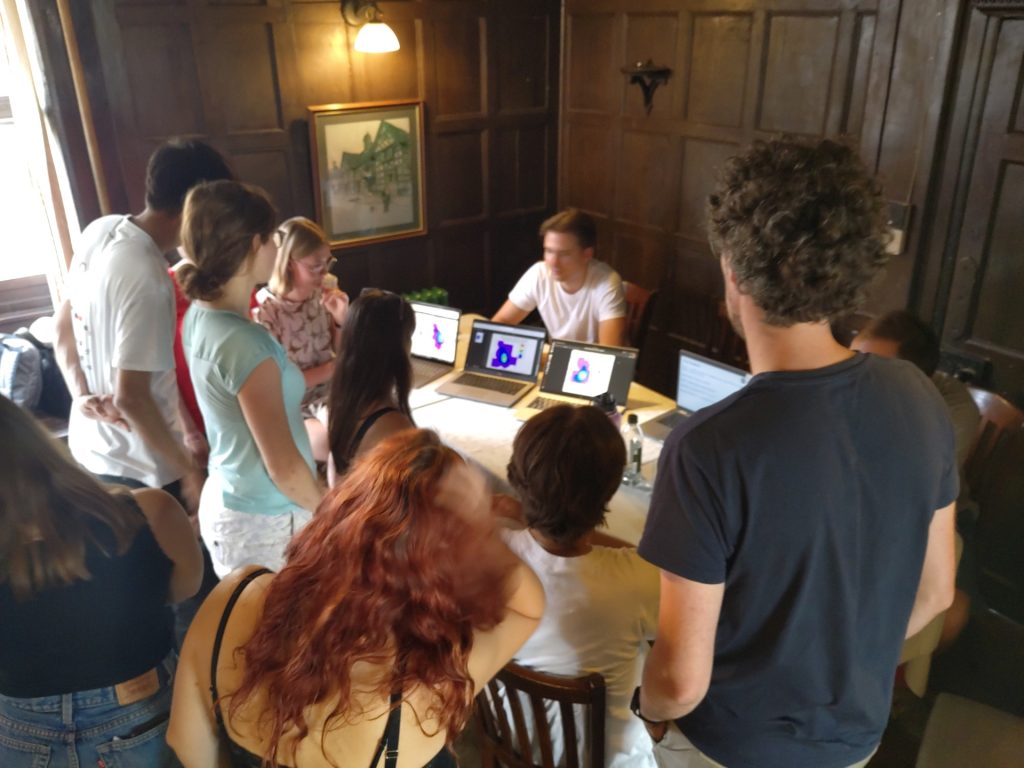
The next day (Thursday) we were back in Southampton with a number of lectures by various speakers from NOC on marine greenhouse gases, marine biogeochemistry and air-sea CO2 fluxes. Ian Folger (NOC) also gave a tour of the sediment core archive and the marine robotics facilities at NOC. The other big topic for this day was policy, including a workshop-type activity, led by Chris Pearce (NOC), in which participants were asked to evaluate the implications of various proposed methods of geoengineering. Practical hands-on experience of taking and analysing marine water samples during a boat trip out into the Solent was the focus on Friday, organised by Peter Brown (NOC).
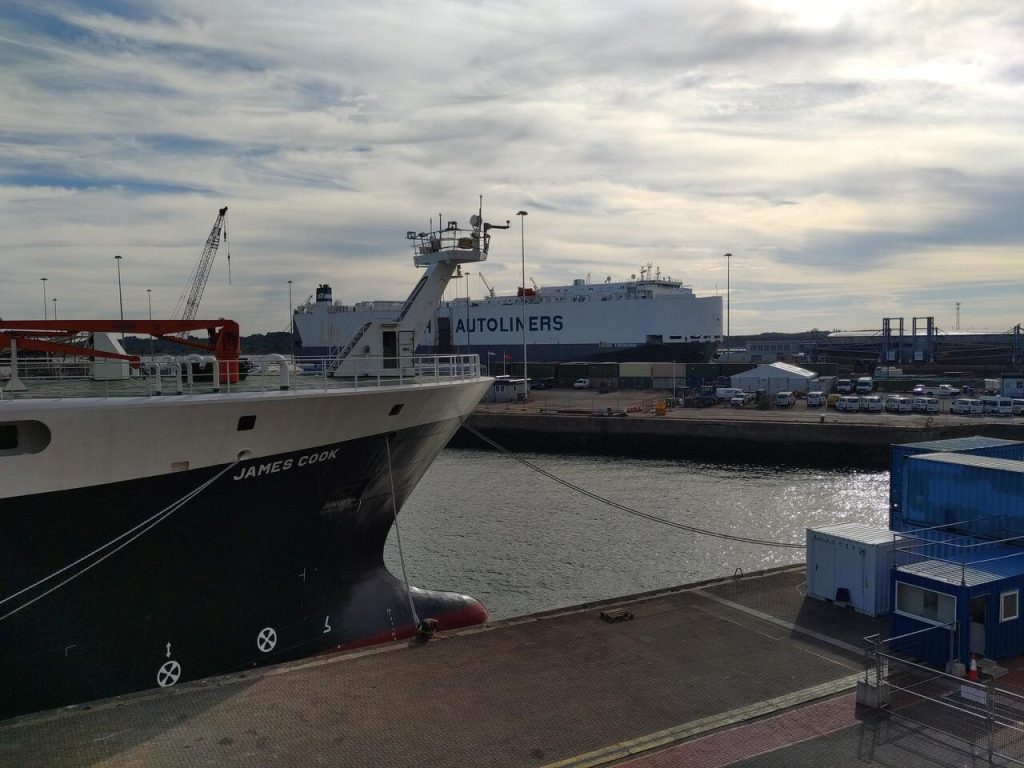
On the last half day (Saturday morning), the students discussed take-home messages from the school. In small groups, they were given a number of questions to focus on, for example, which insights they gained at the school and which knowledge gaps should be addressed by future research. One question (one that is perhaps not asked often enough) was about barriers to research: what factors make your research or your life as researcher unnecessarily difficult? Participants a range of practical issues (e.g. funding and ressources) as well as more systemic issues like unsocial working practices and lack of support structures in academia.
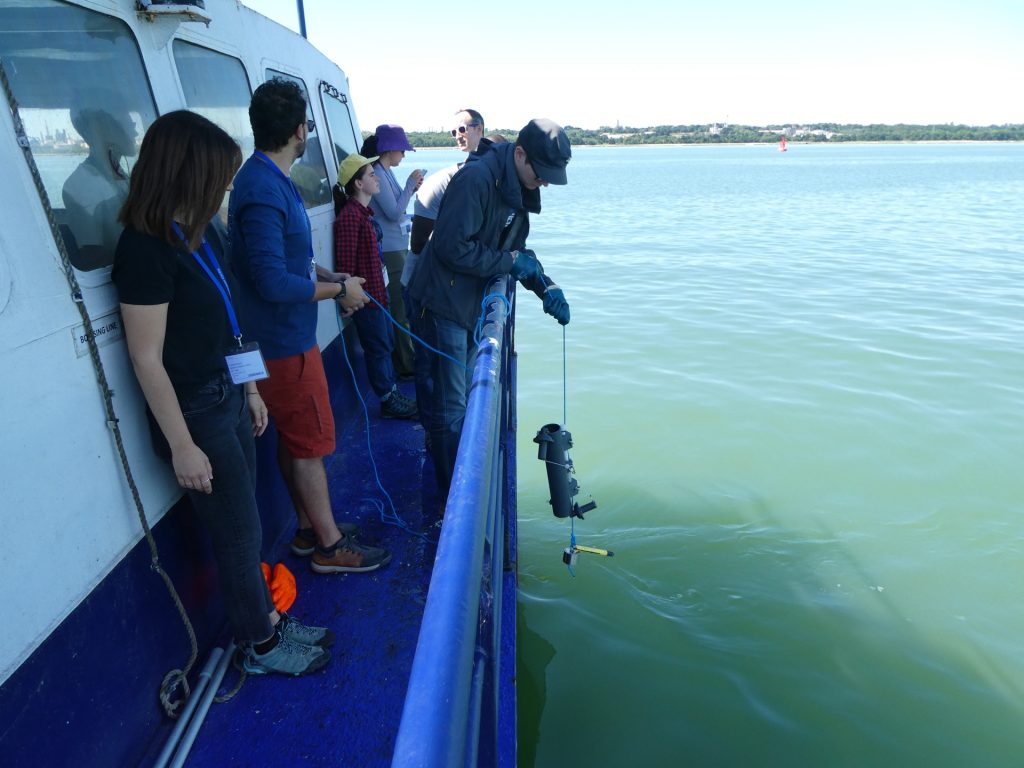
A particular strength of the summer school was the cross-disciplinary approach covering all the different domains (ocean, atmosphere and biosphere). While it is not possible within one short week to adress any topic in great technical detail, there is a clear need for such courses that give a broad overview over the whole research area. Indeed, most of the participants’ own projects don’t fall neatly into one of the traditional disciplines, so the opportunity to learn about the wider picture and interact with like-minded researchers in neighbouring fields was much appreciated.
There is a clear need for more training courses of the scope and level of this summer school. This year’s school was based on similar summer schools in 2015, 2016 und 2017, originally organised as part of the NERC Greenhouse Gas Emissions and Feedback Programme. In each year, we had more applications than places, and it was often hard not being able to offer places to more students who would have benefitted greatly. Therefore, we hope to organise similar summer schools in future.
The Summer School was organised by Peter Brown, Ian Folger, Aoife Grant and Stephan Matthiesen. It was funded by the Natural Environment Research Council as part of the DARE-UK project, and CLASS (Climate-Linked Atlantic Sector Science) project. DARE-UK is a NERC highlight topic NE/S004211/1, CLASS is a NERC National Capability programme (https://projects.noc.ac.uk/class-project/, NE/R015953/1). Additional support is provided by the National Oceanography Centre in Southampton.
